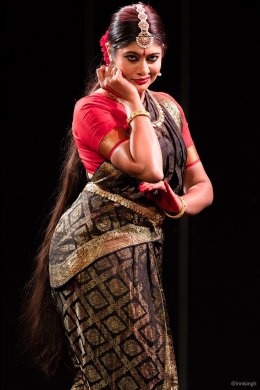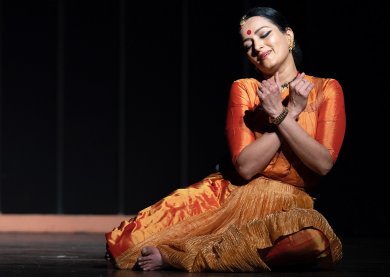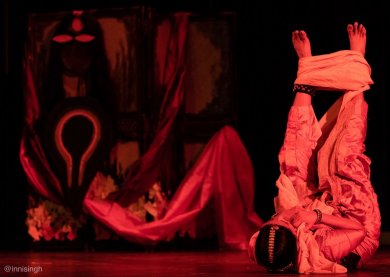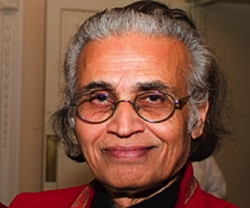
|   |

|   |
 e-mail: sunilkothari1933@gmail.com Madhavi Dance Festival Photos: Inni Singh April 22, 2019 Under the aegis of Kri Foundation, the dance festival in memory of Madhavi Gopalakrishnan, mother of Rama Vaidyanathan, on 3rd April at Habitat Centre, Delhi, explored two dynamic female characters: 'Shoorpanakha' by Dakshina Vaidyanathan Baghel, daughter of Rama Vaidyanathan and 'Still I Rise' centering round Draupadi, showing her plight, as of all women, by Vidhya Subramanian.  Dakshina Vaidyanathan Originally choreographed for 'Patra-Parichay' festival curated by Usha RK in 2014, with title 'Shoorpanakha-the story only she 'nose'', by Dakshina in a format of Kirtanam, with text being sung alternating with jathis and swaras was quite a tour de force. The pun on the word 'nose' was accompanied by an installation with image of face of Shoorpanakha, her nose besmeared with blood having been cut off. But the story narrated and enacted was not what one often listens to in navarasa shloka: Hasyam Shoorpanakha mukhe. Instead, Shoorpanakha plots the murder of none else than her brother Ravana, for having killed her beloved husband Dushtabuddhi. Formerly a favourite of Ravana, he falls out of favour when Ravana suspects that he is growing more in power and may even dethrone him. When Dushtabuddhi is killed by Ravana, the stunned Shoorpanakha plots to take revenge. From there on the story starts engaging audience to know how Shoorpanakha reflects, reminisces, and moves dexterously without letting Ravana suspect what her strategies are. Born in Sri Lanka, a princess, calling herself as Jambudwipabalika, with beautiful eyes like fish, also named Meenakshi, she is fond of her brother. He is not an ordinary one but well versed in Vedashastra, expert in many arts, playing upon veena and a devotee of Lord Shiva. She ties rakhi, the sacred thread on his hand, applies tilak on his forehead, and Ravana tells her that not only on one, but on rest nine also. Her youth is in full bloom. She is married, navavivahita, young, beautiful, but alas her happiness is short lived. She was married to a great warrior but her happiness was short lived. Her husband was killed by her own brother Ravana. She gets enraged and wants to take revenge, pratishodha against her brother. She leaves Sri Lanka and roams in forests in India. Attracted by the fragrance of flowers wafting from a particular direction, she moves towards it and her eyes fall on handsome Rama. He is divine, pure, and loyal to his wedded wife. But he is one who even when her own brother could not lift the bow of Lord Shiva, had easily lifted it and strung together; only such a valorous hero could kill Ravana. She knows that if she were to make advances to Rama, she would be rejected. And if Rama hurts her she as nasikabhushini, nose being cut off, insulted, with her being defaced and arms cut off, run unto her brother Ravana and beg of him to take revenge and punish Rama; not only that knowing Ravana's weakness for women, fill his ears about Sita's beauty and provoke him to kidnap her. Then Rama would attack Ravana and kill him, 'Itham itham drakshyami swamini chitayama' - I shall see him on the same pyre of my husband! Dakshina wore expressions of anger, hate, and revenge in quick succession. As young beautiful princess she displayed young maiden's attributes easily with her own natural beauty. In final sequence with her hair loose and wild she came to the edge of the stage, stepped down the stair and ran into the auditorium towards exit excitedly maneuvering her plan. Such a portrayal of Shoorpanakha is indeed unusual. Extremely captivating with excellent musical support, set to ragamalika, with text and lyrics by Dayananad Jha and Dr S.Vasudevan, music by Dr. S.Vasudevan, nattuvangam by Rama Vaidyanathan, vocals by K.Venkateswaran, mridangam by Viju Sivanand, flute by Rajat Prasanna, their team work was exemplary. The music was recorded. Dakshina is in full form, young and beautiful. Having mastered the technique she is competent to conceive and choreograph the mythological character. Maturing from performance to performance, Dakshina has carved her niche in the field of Bharatanatyam among her contemporaries. 

Vidhya Subramanian
Vidhya Subramanian divides her time between India and California. Disciple of Swamimalai Rajaratnam Pillai of Vazhuvoor bani, she has earned fame as a gifted dancer. Not being content with the traditional Margam in Bharatanatyam, thinking out of the box, she has been working on mythological theme, interpreting it in a manner to have resonance of contemporary issues. In her version, after dramatically narrating life of Draupadi, she has towards the end attempted with vachikabhinaya to raise the issue of patriarchy that treats women in a deplorable manner. On stage, alternative installation of painting shows eyelids of Draupadi, below yoni and on side blurred figure to which is attached a long yellow robe. The colours are of fire, suggesting Draupadi's birth as Yagna sambhuta, born out of fire, daughter of Drupad. Divided into seven acts, in the first act Ashes, we see a figure covered with a veil rising from the ground. It is Draupadi, mourning the loss of her children killed in the Kurukshetra war that took place at her behest. She wanted revenge for all the humiliation she had undergone. She has used Priya Das's Hindi lyrics. Vidhya has created this solo dance theatre, using Tamil, Bengali and Kannada lyrics and English for dialogue and soliloquy. The second act is titled Luminance in two parts. In part A, she reminisces on her birth. The symbolism aimed at 7 chakras beyond the 5 senses suggests 5 Pandavas whom she marries, and she is the 6th sense that connects them. With special light effects, her luminance is well captured, as luminous as fire (agni sambhuta) from which she emerges. In part B, she is seen talking to Gandhari: 'Holding darkness within your soul, you failed to act that day in court, and chose to be as blind as your husband. O Gandhari! Come, see your sons getting punished in hell. The sons you failed to stop from committing shameful acts!' Priya Das's Hindi lyrics are translated by Prof Raghuraman in Tamil. In Act III (Kindling), the narrative moves further where Draupadi tells story of her swayamvara. The condition was to shoot at the eye of a revolving fish up on a pillar, balancing one's self and looking at the reflection below in the water. Karna, the son of a charioteer advances, whom Draupadi rejects saying that he does not belong to a royal family. That becomes a pivotal point for the Kurukshetra war. Draupadi is married off to a stranger Arjuna in guise of a Brahmin. Is he Arjuna, whom Krishna had promised her would be her husband? This section had Bengali lyrics by Rajib Das and Swagato Basumallick. Draupadi, with contempt and arrogance, questions Gandhari, and wonders at a stranger, who succeeds in shooting the eye of the revolving fish and she walks behind Arjuna after being garlanded by him holding his hand, meekly. In Act IV (Combustion), Draupadi questions Yudhishthira on what right he had to put her as a pawn in game of dice, after losing himself. She is dragged in court and is seen falling on the floor with sari entwined around her legs, struggling to free herself. The Tamil poem of Subramanya Bharati expresses Draupadi's agony. Enraged, she asks in court full of elders and her five husbands, it is not only her insult being disrobed, the sari that covers her body, the symbol of her honour, but it is a binding which is a trap under the oppressive patriarchy. She wows to keep her hair loose till Bhima kills violator Dushassana and she anoints her hair with his blood. In Act V (Carnage), Bhima splits Dushassana's body into two. Draupadi smears her hair with the blood, then braids and decorates it with Dushassana's intestines. Her head has tilak of his blood. But the lines blur as poet Kumara Vyasa (Kannada) questions: 'Is it Bhima or is it Draupadi avenging the torment perpetrated on her?' Act VI (Incandescence) is a conversation between Draupadi and Radha in English scripted by Shikha Saklani Malaviya. Draupadi speaks to Sita, and recounts all that as a devoted wedded wife she did, following Rama to forest, being kidnapped by Ravana, brought back when Rama vanquished Ravana, but she had to undergo agnipariksha to prove her chastity and even then when a washerwoman casts aspersions on her character, following his dharma as a king, Rama sends her to forest and Sita decides to go back to her mother earth. Draupadi laughs and tells Radha about her plight as a lover of Krishna, her illicit love, unmarried, Krishna dallying with other gopis and still after the physical union with Krishna, Radha asks Krishna to paint designs of flowers on her breasts with sandal paste! The ashtapadi from Gita Govinda 'Kuru Yadunandana…' appears ironic, and is deliberately sung. In the final Act VII (Uprising) Draupadi tells one and all addressing today's women that nothing has changed. 'Ab Govinda nahi ayenge' (Govinda will not come to rescue us anymore. Therefore rise my sister, my daughter, fight for yourself). Vidhya recites American poet Maya Angelou's time honoured poem 'Till I rise' that gives a powerful message of uprising against the problematic disrespect to women, a problem that simply won't go away. She speaks of the Nirbhaya incident, the humiliation, rape of women that continues to this day. Using Hindi lyrics by Pushyamitra Upadhyay and reciting English poem by Maya Angelou, Vidhya wins applause from the audience which is moved at her clarion call. In the metaphor of using the mythological character of Draupadi, Vidhya in her one woman show succeeds in making her solo dance theatre a memorable performance. The spoken words in English has an excellent effect upon the audience that comprises of different communities, speaking different languages, but knows how humanity and in particular women undergo torture. Vidhya has seen various episodes from Draupadi's life from a first person perspective, using take off points in mythology to transcend into images, to build a bridge between myth and life. One compliments Vidhya for her effort to present her work in this manner. However there are technical glitches. Despite the fact that the music is composed by Rajkumar Bharati and the sound is recorded by Sai Shravanam of Resound Studio, often the words spoken are not clearly audible. Also the voice-over by P.C Ramakrishna sounded loud and with accents which appeared as aimed at foreign audiences. Vidhya has used many languages and lyrics by different poets, some translated into Tamil from Hindi to reach out to larger audiences who may not know Tamil, and the overall impact is affected by too many variations of thematic content. The spoken words in English rendered by her were immediately comprehended by the audience and they gave her loud applause, welcoming her interpretation. I had a neighbor, a well known vocalist from North sitting next to me who was lost in trying to understand the sequence of swayamavara and why Karna was rejected. I understood that my friend did not know her Mahabharata story well or at all and would do well to read simple version of Mahabharata at least in English. This can happen, but also it speaks of some members of audience who are still unaware of the story and therefore unable to understand the implication and interpretation of Vidya's work with contemporary resonances. Both the performances were imaginatively lit up by Milind Srivastav. Arshiya Sethi, scholar, compere and founder of Kri Foundation, did the honours. The response was very good as a large number of rasikas were unable to enter the auditorium as the house was full. I was told that this was also the result of using social media like Facebook, Instagram and catching the young crowd who loves to see a young dancer like Dakshina Vaidyanathan and even the senior one like Vidhya Subramanian, who spoke to audiences on Facebook! Glad to know those who follow these dancers came to see their works.  Dr. Sunil Kothari is a dance historian, scholar, author and critic, Padma Shri awardee and fellow, Sangeet Natak Akademi. Dance Critics' Association, New York, has honoured him with Lifetime Achievement award. Post your comments Please provide your name and email id when you use the Anonymous profile in the blog to post a comment. All appropriate comments posted with name & email id in the blog will also be featured in the site. |